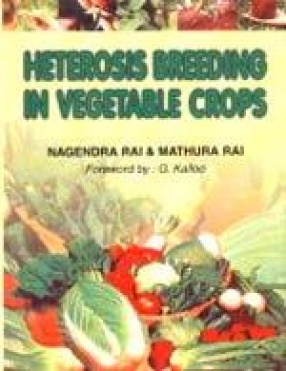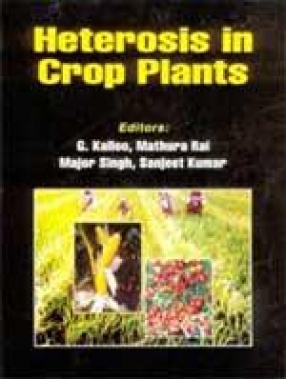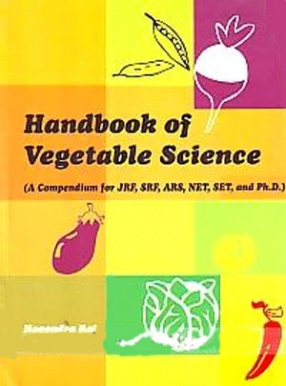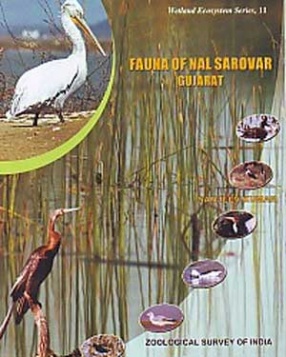In India, the vegetable production is still dominated by the locally available genotypes, land races or open pollinated varieties, which are low yielding and susceptible to various biotic and abiotic stresses. However, the recent advances made in hybrid technology in vegetable crops offer greater potential for higher productivity. Hence, there is a need to grow vegetable hybrids for increased quality, productivity, uniformity, better desirable traits and management of biotic stresses. Development of hybrids plays a pivotal role not only for increasing the productivity but also helps to combat several biotic and abiotic problems faced by farmers. The book entitled “Heterosis Breeding in Vegetable Crops†the authors have made all efforts to compile the complete information on both theoretical and practical aspects of technology of hybrid development in vegetable crops. This publication contains 17 chapters in two sections. The first section includes 10 chapters related to theoretical aspects, viz. (i) Introduction to Heterosis (ii) Basis of Heterosis (iii) Commercial Exploitation of Heterosis (iv) Reproduction, Pollen and Pollen Biotechnology (v) Population Improvement of Parents/Hybrids/Varieties (vi) Genetic Purity Testing of Hybrids (vii) Hybrid Varieties Testing and Release Procedures in India (viii) Biotechnology and Vegetable Improvement (ix) Intellectual Property Rights Related Issues in Hybrid Technology (x) Economics, Import and Export. The second section consists of practical aspect of hybrid seed production on 16 vegetable crops, viz. (xi) Solanaceous Crops-tamati, brinjal, chilli and bell pepper, (xii) Malvaceous Crop-okra (xiii) Cole Crops-cabbage and cauliflower (xiv) Cucurbitaceous Crops-bitter gourd, bottle gourd, cucumber, muskmelon, watermelon, pumpkin, ridge and smooth gourd (xv) Root Crop-carrot. (xvi) Bulb Crop-onion and (xvii) Hints for hybrid cultivation. All the chapters cover references, illustrations and tables. This would be useful to teachers, scientists, students, extension workers, vegetable industry and farmers of this country.
Heterosis Breeding in Vegetable Crops
$101.70
$113.00
In stock
Free & Quick Delivery Worldwide
All orders amounting to US$ 50 or more qualify for Free Delivery Worldwide. For orders less than US$ 50, we offer Standard Delivery at $14 per book.
ABOUT THE AUTHOR Mathura Rai
Mathura Rai, is Director at Indian Institute of Vegetable Research with additional responsibility of Project Coordinator of AICRP (VC) and NSP (Vegetable) at Varanasi, UP, India. Dr. Rai is an eminent Horticulturist with rich experiences in Plant Genetic Resources, management and improvement of vegetable and fruit crops. He has also worked as OSD, NRC, Litchi, Muzafarpur and Head, HARP Ranchi. Dr. Rai is Author/Co-author of seven books, tow descriptors, one catalogue, thirty technical bulletins, fifty eight extension leaf lets and fifty five chapters in different books. He has to his credit about 200 research papers and popular articles. During the tenure of Dr. Rai, Indian Institute of Vegetable Research was bestowed as best Institute Award, Best Coordinated Research Project Award and Best Annual Report Award from Indian Council of Agricultural Research, New Delhi. Dr. Rai and hsi team have evolved and released forty six varieties in tomato, brinjal, chilli, cowpea, French bean, cucumber, bottle gourd, ridge gourd, okra, pea, radish, cauliflower, muskmelon, ashgourd, pumpkin in vegetables and jack fruit in fruit crop. These varieties are becoming popular for their specific traits in different parts of country. Dr. Rai is President of Horticultural Society, Chotta Nagpur and Joint Secretary of the Indian Society of Vegetable Science. He is a fellow of Indian Society of Vegetable Science and member of Horticultural Society of India, Indian Society of Plant Genetic Resources and Indian Society of Genetics and Plant Breeding. He is recipient of Harbhajan Singh Award Constituted by Indian Society of Vegetable Science.
ABOUT THE AUTHOR Nagendra Rai
Nagendra Rai, is Senior Scientist, Indian Institute of Vegetable Research, Varanasi. Dr. Rai received his Ph.D. degree in Horticultural from Banaras Hindu University, Varanasi in 1992. He has taught vegetable breeding courses to post graduate students at Indira Gandhi Krishi Vishawavidyalaya, Raipur, chhattisgarh for about 7 years and guided post graduate students in the discipline of vegetable breeding. He worked as Incharge for all India Coordinated Vegetable Research Programme at IGKV, Raipur. Dr. Rai has published over 100 research papers and popular articles. Dr. Rai has evolved and released a short duration variety of tomato adopted in rice based cropping system for mid hill agroclimatic conditions. He is recipient of Crop Research Award 2004 constituted by Gaurav Society of Agriculture Information Centre, Haryana for his outstanding contribution in vegetable breeding. He has authored the book "Advances in Vegetable Production". He travelled and has attended in several national and international conferences. He is presently working on improvement of tomato, French bean and Indian bean at Indian Institute of Vegetable Research, Varanasi.
reviews
0 in total
Review by Anonymous
Be the first to review “Heterosis Breeding in Vegetable Crops” Cancel reply
You must be logged in to post a review.
Bibliographic information
Title
Heterosis Breeding in Vegetable Crops
Author
Edition
1st ed.
Publisher
ISBN
8189422030
Length
xii+531p., Tables; Figures; References; Glossary; Plates; Appendices; Index; 25cm.
Subjects







There are no reviews yet.